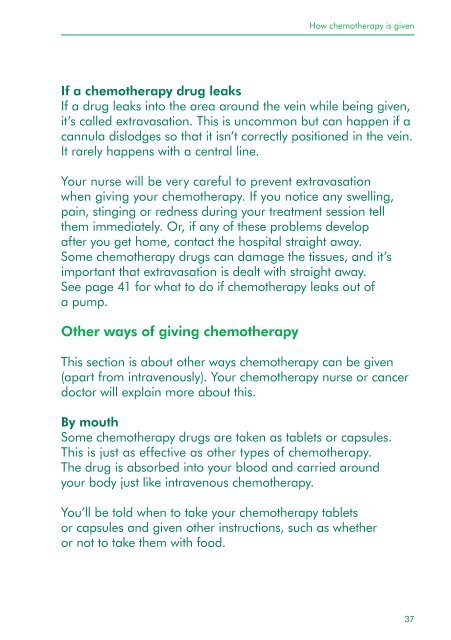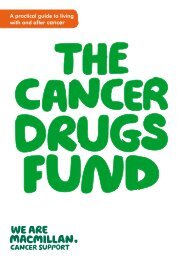Understanding chemotherapy - Macmillan Cancer
Understanding chemotherapy - Macmillan Cancer
Understanding chemotherapy - Macmillan Cancer
Create successful ePaper yourself
Turn your PDF publications into a flip-book with our unique Google optimized e-Paper software.
How <strong>chemotherapy</strong> is givenIf a <strong>chemotherapy</strong> drug leaksIf a drug leaks into the area around the vein while being given,it’s called extravasation. This is uncommon but can happen if acannula dislodges so that it isn’t correctly positioned in the vein.It rarely happens with a central line.Your nurse will be very careful to prevent extravasationwhen giving your <strong>chemotherapy</strong>. If you notice any swelling,pain, stinging or redness during your treatment session tellthem immediately. Or, if any of these problems developafter you get home, contact the hospital straight away.Some <strong>chemotherapy</strong> drugs can damage the tissues, and it’simportant that extravasation is dealt with straight away.See page 41 for what to do if <strong>chemotherapy</strong> leaks out ofa pump.Other ways of giving <strong>chemotherapy</strong>This section is about other ways <strong>chemotherapy</strong> can be given(apart from intravenously). Your <strong>chemotherapy</strong> nurse or cancerdoctor will explain more about this.By mouthSome <strong>chemotherapy</strong> drugs are taken as tablets or capsules.This is just as effective as other types of <strong>chemotherapy</strong>.The drug is absorbed into your blood and carried aroundyour body just like intravenous <strong>chemotherapy</strong>.You’ll be told when to take your <strong>chemotherapy</strong> tabletsor capsules and given other instructions, such as whetheror not to take them with food.37
















